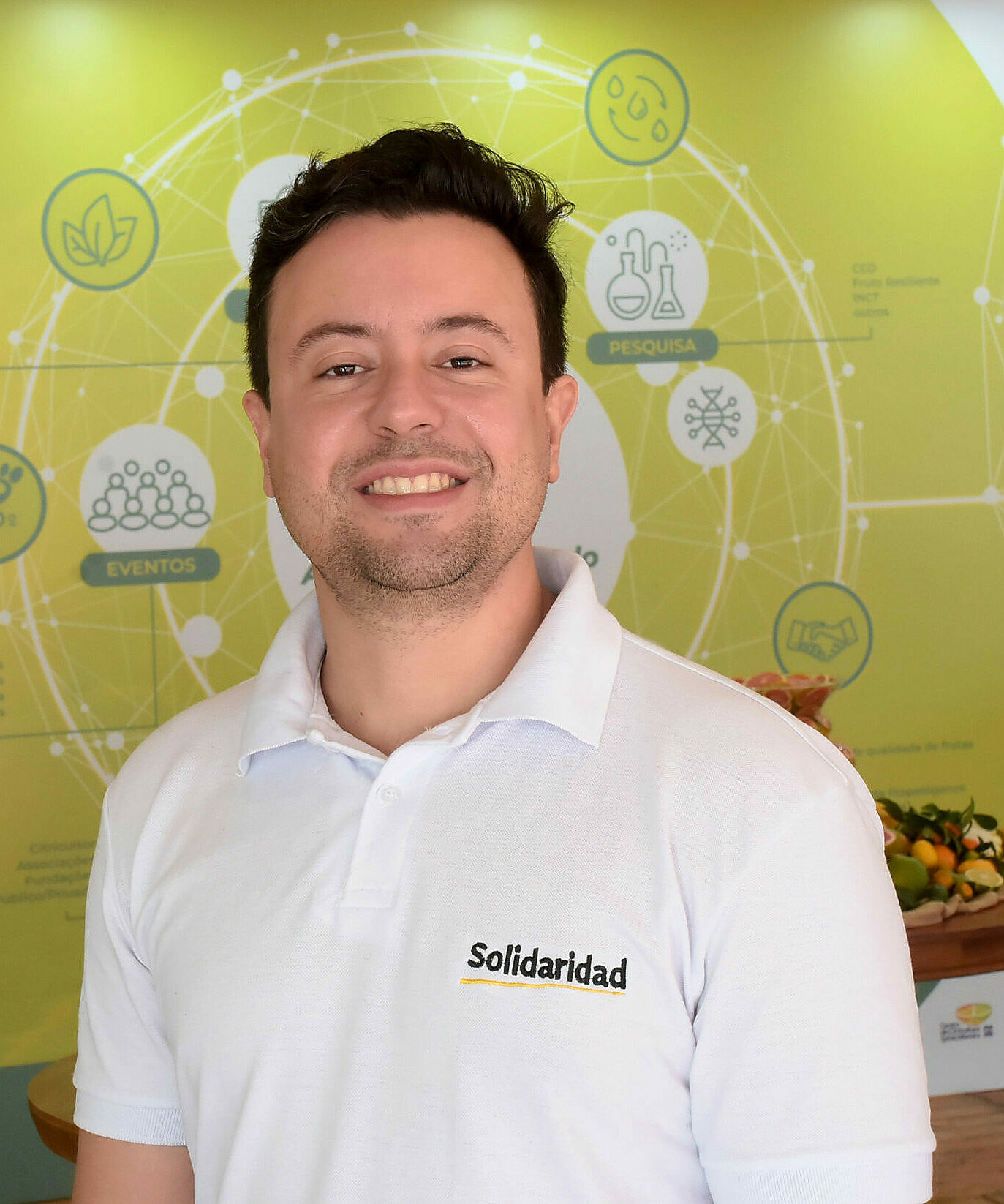Interview with Guilherme Ortega of Solidaridad, Brazil
15th March 2024

Overview
“By using the internationally recognised FSA, we have been able to build collective capacity and promote continuous improvement”

Solidaridad is an international civil society organisation, working in over 40 countries, to support the development of socially responsible, ecologically sound, and profitable supply chains. For the last 15 years, Solidaridad has been working towards this goal in Brazilian agriculture. It promotes public private partnerships and innovative solutions to accelerate the transition to inclusive, low carbon production.
In 2019 Solidaridad initiated Fruto Resiliente: Strengthening Sustainable Orange Production. This pre-competitive initiative aims to improve agricultural practices of 500 small farmers in the Brazilian Citrus Belt. The project, supported by juice processors and international bottlers, helps farmers to comply with Brazilian legislation, labour and environmental requirements, and improve the long-term viability of their farming businesses. Additionally, Fruto Resiliente supports farmers in demonstrating and verifying their performance against SAI Platform’s Farm Sustainability Assessment (FSA).
We caught up with Guilherme Ortega, Programme Manager at Solidaridad in Brazil to hear more about the impact of this cross functional initiative.
Where do you see the opportunities when it comes to sustainability in Brazil and with small farmers?
Guilherme Ortega: Three of every five glasses of orange juice produced in the world are from Brazil. The sector is fundamental for the local economy, especially in the States of São Paulo and Minas Gerais. However, orange growers face many issues that have resulted in a lot of small farmers leaving the sector in the last 10 years. Those remaining, often face challenges to comply with international standards required by the consumer markets.
In collaboration with our partners, our work helps farmers to understand their importance in the citrus industry and how they can contribute to a sustainable sector. Orange farmers are open to new and innovative practices and many small farmers are already implementing sustainable practices on their farms. Most farmers in the region we work respect Brazilian environmental legislation, make use of ecological mowers, protect native vegetation on their farms and seek better solutions for the control of pests.
However, they need more assistance with the social pillar. We are helping farmers to understand and apply requirements on hiring workers and implementing health and safety practices in the field. Likewise, Solidaridad’s extension workers are assisting farmers with soil and leaf analyses that support them to make better decisions, and water analysis that enables farmers to improve the quality of drinking water at the farm and be more efficient in the use of certain products.
What are the challenges and opportunities facing female farmers in Brazil today?
Guilherme Ortega: Agriculture is still a very masculine environment, although we do see more women leading farms now. In the Fruto Resiliente project, farms with better results often have women in key roles. We work mainly with family businesses, so when we visit a farm, we invite the whole family to participate, so they understand that everybody plays a role in decision making.
It is also important that we do our homework. In Solidaridad, we train our staff on gender inclusion, on how to approach the topic with farmers and to identify opportunities for women to lead. We are very proud that half of the members of the orange team at Solidaridad are women, including extension services. They help to bring an experienced perspective to our activities.
Why is FSA verification important to the farmers that Solidaridad is working with? How does their FSA verification create commercial value?
Guilherme Ortega: Sustainable production is no longer an option for farmers. To ensure quality and marketability, farmers need to not only comply with the legislation, but prove that they are aligned with globally recognised good agricultural practices.
When designing the project, it was important to find a sustainability verification model that could accommodate Brazilian regulations, but also have credibility with the companies and the markets that buy Brazilian orange juice. The FSA is widely accepted in the fruit juice industry and provides a fair framework for farmers, respecting local contexts while driving the transition to more sustainable production. By using the internationally recognised FSA, we have been able to build collective capacity and promote continuous improvement, especially for the farmers seeking verification.
Why is it important to bring smallholder farmers along on sustainability journeys? What are some of the lessons that smallholder farmers can teach companies about collaboration and resilience?
Guilherme Ortega: Smallholder farmers represent 80% of the farms in the Brazilian Citrus Belt. They are an important part of the orange sector. Orange production is part of local culture – we have third generation orange farmers participating in the project. Strengthening resilience and bringing farmers along this sustainability journey contributes to consolidating Brazilian citrus production and helps to improve farmer livelihoods.
In some of the areas we work, farmers keep in touch with each other all the time, exchanging knowledge and information. Our extension services take farmers to visit others, so they can learn by example, and strengthen their ties as a community. Pests and diseases have affected great parts of the Citrus Belt, and the capacity to reinvent and overcome difficulties, demonstrates the resilience of citrus growers in Brazil. The collaboration of the whole chain, with the industry and research centres, is what makes farmers want to produce more and better.
Lastly, what advice would you have for other initiatives considering implementing the FSA with smallholder farmers?
Guilherme Ortega: I would say that the FSA offers a realistic verification process, that takes into consideration the different ways and contexts of producing. For the Fruto Resiliente project, it was an important step to have our practices benchmarked against the FSA and it continues to act as a key lever in our conversations with farmers and partners.